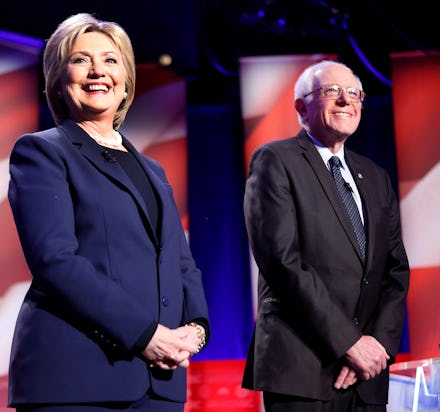Hillary Clinton Won the 5th Democratic Debate by Sharpening Her Attacks on Bernie Sanders

Seeking to bounce back from an uncomfortably narrow win in the Iowa caucuses — and staring down a likely defeat in Tuesday's New Hampshire primary — Hillary Clinton notched another debate win at the Democrats' showdown in Durham, New Hampshire, on Thursday, sharpening her lines of attack against rival Bernie Sanders, who failed to do anything to upend the fundamental dynamics of a race in which Clinton is still the heavy favorite.
Appearing in their first one-on-one face-off of the 2016 campaign — former Maryland Gov. Martin O'Malley withdrew his long-shot bid on Monday after a dismal showing in Iowa — Clinton and Sanders engaged in some of their most spirited exchanges to date, laying bare the Democrats' divide between a vision rooted in pragmatism and compromise and an alternative that emphasizes expanding the contours of the political discourse.
Sanders turned in a serviceable performance, deftly handling Clinton's contention that Sanders' conception of progressivism was so rigid that it would exclude President Barack Obama, because Obama has accepted campaign contributions from Wall Street.
"We are in much better shape today than we were seven years ago, although my Republican colleagues seem to have forgotten where we were seven years ago. That's the fact," Sanders said. "Do I think President Obama is a progressive? I do. I disagree with him on a number of issues. I think he's done an excellent job."
Escalated attacks: But when Clinton took Sanders to task for waging an "artful smear" against her by insinuating that she was bought and paid for by Wall Street interests, Sanders struggled to respond effectively.
"Sen. Sanders says he wants to run a positive campaign. I've tried to keep my disagreements over issues, as it should be," Clinton said. "Time and time again, by insinuation, there is this attack that he is putting forth, which really comes down to, you know, anybody who ever took donations or speaking fees from any interest group has to be bought."
"I have stood up and I have represented my constituents to the best of my abilities, and I'm very proud of that," Clinton continued. "I think it's time to end the artful smear that you and your campaign have been carrying out in recent weeks and let's talk about the issues that divide us."
While Clinton called for Sanders to identify specifically where she had taken a course of action because of industry support, the Vermont senator was elliptical in his reply.
"There is a reason why these people are putting huge amounts of money into our political system," Sanders said. "In my view, it's undermining American democracy and allowing Congress to represent wealthy campaign contributors and the working families of this country."
In discussing specific examples, though, Sanders dwelled mostly on Republican opposition to climate science and President Bill Clinton's 1990s banking deregulation — never clearly connecting Clinton's Wall Street speaking fees and campaign fundraising to any objectionable actions she'd taken.
A foreign policy rout: But the differences between the two candidates were clearest when the focus of the debate turned to foreign policy.
Naturally, the nation's former top diplomat had an advantage in this area. But Sanders, who has spent the bulk of his career focused on issues of wealth inequality, continued to evince little expertise or interest in global affairs.
Discussing the threat posed by the Islamic State terrorist group, also known as ISIS, Sanders fell back on his 2002 vote against the Iraq War, a frequent talking point. Clinton voted to authorize the war as a senator from New York.
"We did differ," Clinton acknowledged. "A vote in 2002 is not a plan to defeat ISIS. We have to look at the threats that we face right now and we have to be prepared to take them on and defeat them."
And while Clinton discussed the fight against ISIS with fluency — talking about engaging Sunni tribes in Iraq's Anbar province, for instance — Sanders spoke in broad generalities about a "war for the soul of Islam."
Nothing new here: Clinton's performance was hardly flawless. She continued to stumble over the issue of her post-State Department speaking gigs, refusing to commit to releasing transcripts of her talks before corporations and trade associations. And she provoked fierce criticism from progressives with her defense of capital punishment, an issue on which she parts from most Democratic voters.
Moreover, Sanders hardly put himself at risk of losing his healthy lead in the Granite State. Railing against a "rigged economy," the senator once again spoke the language of restive progressives, and his compelling closing statement demonstrated a dramatic improvement in his performance as a debater.
"My dad came to this country at the age of 17 from Poland. Didn't have any money, couldn't speak English," Sanders said. "He died pretty young, and I think it would have been beyond his wildest dreams to see his son up here on this stage today running for president."
"I love this country and my dad loved this country and he was the most proud American because of what it gave him in terms of raising his family, even though we never had much money," the senator added, launching into his familiar call for a more equitable society.
But while Sanders remains on course to win New Hampshire next week — and has the fundraising prowess to remain in the race into the spring — he didn't land any knockout blows against Clinton, whose reservoir of support among minority voters in later-voting states gives her the upper hand over Sanders down the road.
In not losing — and in forcefully challenging Sanders — Clinton came out on top Thursday night.